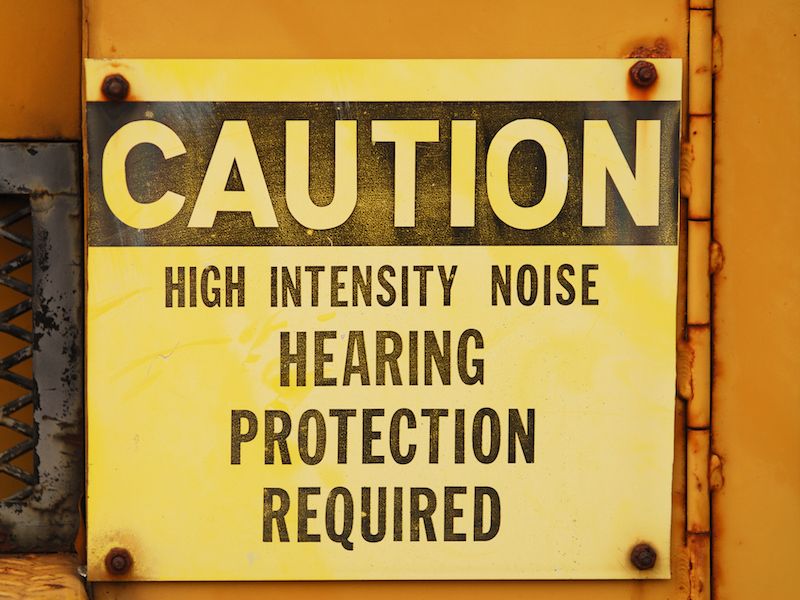
It’s one thing to realize that you should safeguard your ears. Recognizing when to protect your ears is a different story. It’s more challenging than, for example, knowing when you need sunblock. (Are you going to go outdoors? Is there sunlight? You should be using sunscreen.) It’s not even as easy as determining when to use eye protection (Handling hazardous chemicals? Doing some building? You need to wear eye protection).
It can feel as though there’s a large grey area when dealing with when to use ear protection, and that can be risky. Unless we have particular knowledge that some activity or place is dangerous we tend to take the easy path which is to avoid the problem altogether.
Evaluating The Risks
In general, we’re not very good at assessing risk, especially when it comes to something as intangible as lasting hearing problems or loss of hearing. To demonstrate the situation, check out some examples:
- Person A goes to a very loud rock concert. The concert lasts roughly 3 hours.
- Person B has a landscaping company. She spends a considerable amount of time mowing lawns, then she goes home to a quiet house and reads a book.
- Person C works in an office.
You may believe the hearing hazard is greater for person A (let’s just call her Ann). Ann leaves the show with her ears ringing, and she’ll spend the majority of the next day, struggling to hear herself speak. It seems reasonable to presume that Ann’s activity was quite risky.
Person B (let’s just call her Betty), on the other hand, is exposed to less noise. Her ears don’t ring. So her ears must be safer, right? Not necessarily. Because Betty is mowing all day. Actually, the damage builds up a little bit at a time even though they don’t ring out. Even moderate noises, if experienced with enough frequency, can harm your ears.
Person C (let’s call her Chris) is even less obvious. Lawnmowers come with instructions that point out the dangers of persistent exposure to noise. But despite the fact that Chris has a relatively quiet job, her long morning commute through the city every day is quite loud. Also, while she works behind her desk all day, she listens to her music through earbuds. Does she need to think about protection?
When is it Time to Worry About Protecting Your Ears?
Generally speaking, you should turn down the volume if you have to raise your voice to be heard. And you need to think about using earplugs or earmuffs if your surroundings are that noisy.
If you want to think about this a bit more clinically, you should use 85dB as your limit. Noises above 85dB have the potential to result in injury over time, so in those scenarios, you should consider wearing hearing protection.
Your ears don’t have their own decibel meter to warn you when you reach that 85dB level, so countless hearing specialists suggest downloading special apps for your phone. These apps can inform you when the surrounding noise is getting close to a hazardous level, and you can take proper steps.
A Few Examples
Even if you do get that app and take it with you, your phone may not be with you wherever you go. So a few examples of when to safeguard your ears may help you develop a good standard. Here we go:
- Driving & Commuting: Spending all day as an Uber or Lyft driver? Or maybe you’re just hanging around downtown for work or boarding the subway. The constant noise of living in the city, when experienced for 6-8 hours every day, can cause injury to your ears over the long haul, particularly if you’re cranking up your music to hear it over the commotion.
- Exercise: Your morning spin class is a perfect example. Or perhaps your daily elliptical session. You may consider wearing hearing protection to each one. Those instructors who use sound systems and microphones (and loud music) to motivate you might be good for your heart rate, but all that volume is bad for your ears.
- Listening to music with earbuds. This one calls for caution, not protection. Whether your music is going directly into your ears, how loud it is playing, and how long you’re listening to it are all things you should give consideration to. Noise-canceling headphones are a smart choice to steer clear of having to turn the volume way up.
- Domestic Chores: Even mowing a lawn, as previously stated, requires hearing protection. Chores, such as mowing, are probably something you don’t even think about, but they can lead to hearing impairment.
- Using Power Tools: You understand that working all day at your factory job is going to call for hearing protection. But how about the enthusiast building in his garage? Even if it’s only a hobby, hearing specialists recommend wearing hearing protection if you’re working with power equipment.
These illustrations may give you a suitable baseline. If there is any doubt, though, wear protection. Instead of leaving your ears exposed to future damage, in most instances, it’s better to protect your hearing. Protect today, hear tomorrow.